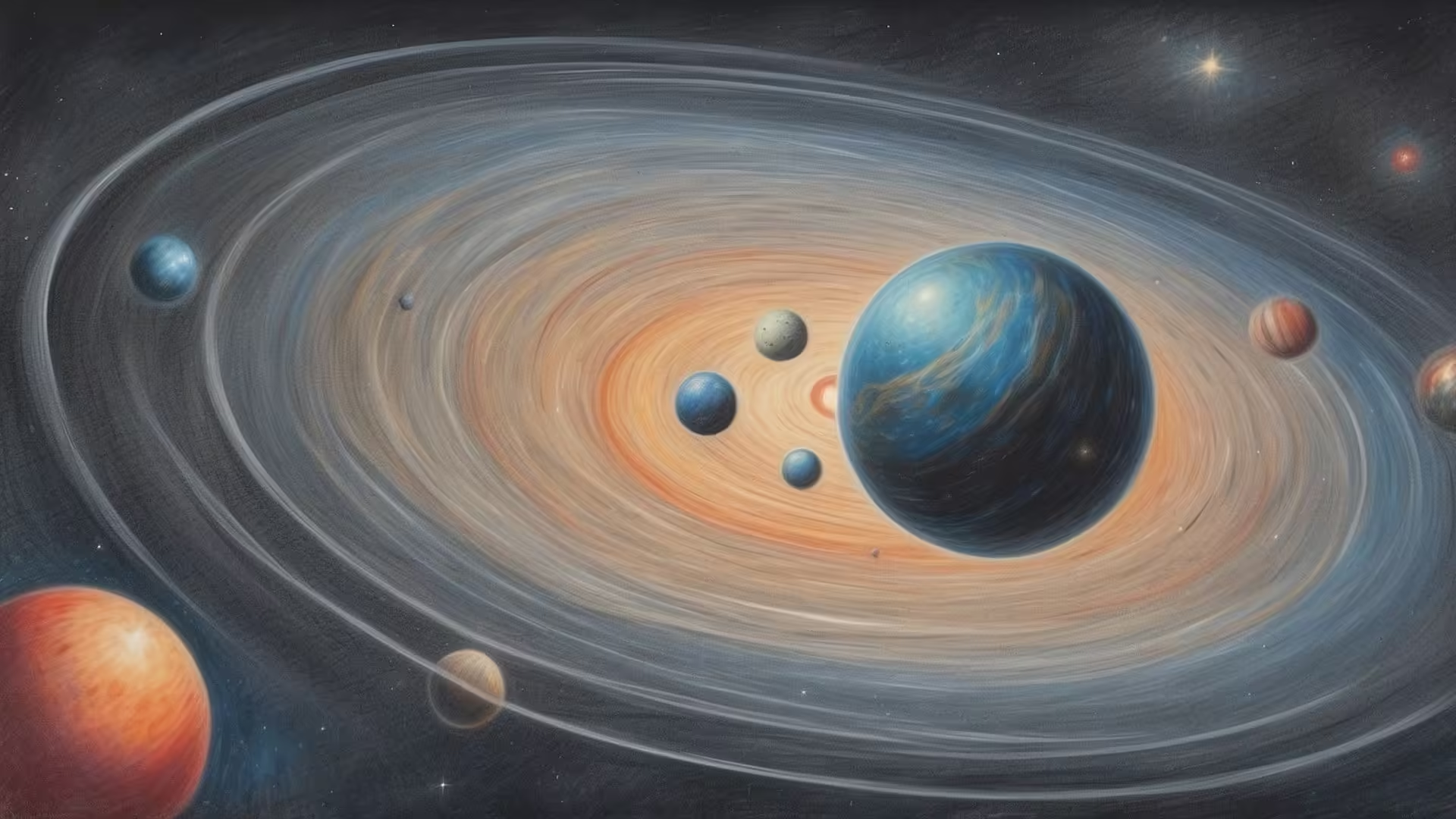Gravity is one of the fundamental forces of nature, influencing every object in the universe. From tiny particles to massive galaxies, gravity governs motion and shapes the structure of the cosmos. But what causes gravity? While it might seem simple on the surface—heavier objects pull on lighter ones—the science behind it is much deeper and more complex.
The Origins: Newton’s Law of Universal Gravitation
In the 17th century, Sir Isaac Newton was the first to describe gravity in mathematical terms. Newton’s law states that every mass attracts every other mass with a force that’s directly proportional to their masses and inversely proportional to the square of the distance between them. In simpler terms, the more massive an object, the stronger its gravitational pull, and the closer the objects are, the stronger the force. This law works well for most everyday phenomena, but it doesn’t fully explain what gravity is or how it works at extreme cosmic scales.
Einstein’s Theory of General Relativity: Gravity as Curved Space-Time
In the 20th century, Albert Einstein changed the way we think about gravity with his theory of general relativity. According to Einstein, gravity isn’t just a force between two objects but rather the result of curved space-time. Massive objects like planets and stars warp the space and time around them, creating a kind of well that other objects fall into. Imagine placing a bowling ball on a trampoline; smaller objects roll toward the ball because the fabric has been stretched. That’s how gravity works on a cosmic scale—large objects bend space-time, and smaller objects move along these curves.
Quantum Gravity: An Unsolved Mystery
While Newton’s and Einstein’s theories explain a lot, there’s still a major piece of the puzzle missing: how gravity fits into the quantum world. Quantum mechanics governs the behavior of particles at the smallest scales, but gravity doesn’t fit neatly into this framework. Scientists are still searching for a unified theory that merges general relativity with quantum mechanics. This ongoing quest is known as the search for quantum gravity, and solving it could unlock some of the universe’s biggest secrets.
The Role of Gravitational Waves
Recent discoveries have added a new dimension to our understanding of gravity. In 2015, scientists detected gravitational waves—ripples in space-time caused by massive cosmic events like the collision of black holes. These waves confirm Einstein’s predictions and provide a new way to study the universe. Gravitational waves carry information about objects and events billions of light-years away, giving scientists a tool to explore the cosmos like never before.
Everyday Examples of Gravity in Action
Though gravity might seem like an abstract concept, it affects our daily lives in countless ways. It’s the reason objects fall when dropped, why we stay firmly on the ground, and why the Moon orbits the Earth. Gravity also keeps our solar system in order, preventing planets from drifting off into space. Even your body experiences gravity constantly, with your muscles and bones working against it to maintain posture and movement.
Gravity is much more than just the force that pulls objects to the ground—it’s a complex, fascinating phenomenon that governs the behavior of the universe. From Newton’s mathematical laws to Einstein’s elegant theories of space-time and the latest discoveries in gravitational waves, gravity continues to reveal new insights about the nature of reality. And while we’ve come a long way in understanding it, the search for quantum gravity reminds us that there’s still much to learn. So next time you drop something or marvel at the night sky, remember: gravity is everywhere, and it’s far more intriguing than it seems.
Let’s Talk
So, gravity, huh? It’s kind of wild when you really think about it. We take it for granted every single day, yet it’s literally holding our world together. I mean, imagine a world without gravity—cups of coffee floating away, people bumping into ceilings, and let’s not even start with what it would do to your morning toast. But here’s the thing: the more we learn about gravity, the more questions it raises. Ever wonder why gravity even exists in the first place? I mean, why does mass have the power to pull other objects toward it? It’s not like planets are sitting around thinking, “Hey, I really want to pull this asteroid over here.” Or are they? Okay, maybe not, but it’s weird how something so invisible is so powerful.
And let’s not forget the cosmic ballet gravity orchestrates. The Moon’s gravitational pull isn’t just there to make it pretty hanging in the night sky—it also controls the ocean tides! Yeah, every time you go for a swim in the sea, thank the Moon for those waves. Without gravity, the oceans would just… kind of sit there, unmoving. Boring, right? Not to mention that gravity is what keeps our entire solar system functioning. The Sun’s gravity locks planets into their orbits. Without it, we’d all be flung into space like those amusement park rides that spin you so fast you can’t lift your head. Space is fun to think about until you remember it’s freezing, oxygen-less, and infinite.
Here’s another curveball: did you know gravity isn’t the same everywhere? That’s right! Gravity on Earth varies depending on where you are. You weigh slightly less at the equator than at the poles. It’s not enough to make a difference unless you’re an astronaut or super precise scientist, but it’s kind of fun to think about—maybe take your next vacation somewhere gravity is a tad lighter. There are also places called gravitational anomalies. If you’ve heard of the “mystery spots” where things roll uphill, that’s usually a trick of perspective, but real gravitational anomalies exist too. Some are caused by large underground masses, like a concentration of heavy minerals, which ever so slightly tweak the gravitational pull.
And speaking of astronauts—gravity is their biggest nemesis… or maybe their frenemy. Up there in space, they experience what’s called microgravity. That means their muscles weaken, their bones lose density, and their sense of balance gets all messed up because their inner ear has no “down” to orient itself. It sounds like fun to float around, but astronauts spend months doing intense exercises just so they can keep walking when they come back to Earth. Ever tried working out in space? Me neither, but from what I hear, it’s not exactly a walk in the park.
What’s even crazier is how gravity can mess with time. Yeah, you heard that right—gravity affects time. The stronger the gravitational pull, the slower time moves. It’s called time dilation, and it’s been proven with atomic clocks. If you put one clock on a plane flying around the world and leave the other on the ground, the airborne clock will show a tiny difference—just a fraction of a second slower. It’s wild to think that time isn’t as fixed as we imagine. Does that mean if we live on a high mountain, we’re aging faster than someone at sea level? Technically, yes, but don’t start planning your move just yet—the difference is way too small to matter.
And let’s not forget black holes—the ultimate gravity monsters. These things have so much gravitational pull that not even light can escape them. Once you get too close to a black hole’s event horizon, that’s it—game over. It’s both terrifying and fascinating. Some theories suggest that black holes could connect to other points in the universe, like cosmic shortcuts or wormholes. But who knows? If there’s a wormhole at the end of a black hole, what are the chances you’d come out somewhere nice, like a beach planet with endless sunsets? Slim, I’d say.
Gravity also sneaks into everyday life in the smallest, strangest ways. Ever notice how you feel heavier on a rainy day? It’s not just in your head—the weight of all that water in the atmosphere really does increase atmospheric pressure, making you feel a tiny bit more weighed down. Not enough to ruin your day, but still, it’s a fun excuse if you’re feeling sluggish: “It’s not me; it’s gravity.”
In the end, what I find fascinating is that gravity is still a bit of a mystery. We know how it works, and we can predict what it will do, but the why—the real fundamental reason it exists—is something scientists are still figuring out. Maybe it’s a feature of the universe we’ll never fully understand. Or maybe, one day, someone will figure out how to manipulate gravity. Anti-gravity boots, anyone? Now that would be a game-changer. Until then, I guess we’ll just have to live with it—walking, running, jumping, and, occasionally, falling flat on our faces. But hey, at least now you know a bit more about the invisible force pulling the strings behind it all.
Let’s Learn Vocabulary in Context
So, let’s dive into some of the key vocabulary that popped up while we talked about gravity. Some of these words might sound a little technical, but trust me, they’re more useful in everyday life than you’d think. Take “gravitational pull,” for example. It’s not just for scientists; you can use it when you’re joking about being drawn toward something—like the “gravitational pull” of your couch on a lazy Sunday afternoon. Pretty relatable, right?
Then there’s “mass.” We mentioned that mass is what gives objects gravity, but in everyday talk, you can use mass to refer to the size or weight of anything. For instance, you could say, “This bag of groceries feels like it has the mass of a small planet,” when you’re really just exhausted after shopping. Or maybe it’s not the groceries—maybe the “atmospheric pressure” has you feeling heavier. We touched on how rain adds weight to the air, but you can also use the phrase to describe feeling stressed, like “There’s so much atmospheric pressure at work lately!” See? Science meets life.
Next up is “orbit.” We often think of it as a cosmic term, but it works for everyday situations too. You know when someone new joins your group of friends, and suddenly everything starts revolving around them? You could say, “It’s like they’ve become the center of our orbit.” It’s a playful way to describe how people gravitate toward someone—again, gravity sneaking into our language.
“Time dilation” is another cool one. In science, it’s about time slowing down near strong gravity, but in real life, you can use it to describe those moments when time seems to stretch endlessly—like waiting for a text reply that feels like an eternity. “I swear, waiting for their response is the closest thing to time dilation I’ve ever experienced.”
How about “black hole?” We all know it’s an object in space with gravity so strong that not even light can escape, but it’s also a perfect metaphor. Ever spend hours on YouTube or scrolling through your phone without realizing it? Boom. That’s a black hole—“I fell into a YouTube black hole, and suddenly it was 2 AM.” We’ve all been there.
Another fun phrase is “curved space-time.” In physics, this is how gravity works—objects warp the space and time around them. But you could totally use it to describe a messy situation. “Trying to make sense of this project feels like navigating curved space-time.” A bit nerdy? Sure. But it’ll definitely make you sound clever.
Let’s talk about “gravitational waves.” These are ripples in space-time caused by cosmic events, but they also make for a poetic way to describe emotions. “That speech hit me like gravitational waves—unexpected but powerful.” Or when someone’s actions create a ripple effect, you can say, “Their decision sent gravitational waves through the whole team.”
We also mentioned “microgravity” in the context of astronauts, but it’s a cool way to describe any situation where things feel lighter than usual. “After finishing that tough assignment, it felt like I was floating in microgravity.” Perfect for those moments of relief when the weight is finally off your shoulders.
Finally, let’s revisit “event horizon.” In space, it’s the point around a black hole where there’s no turning back. But it works just as well in real life. Ever been in a situation where you know you’re committed no matter what? “The moment I clicked ‘Buy Now,’ I was past the event horizon.” No going back now.
Okay, let’s wrap this up with a couple of questions for you to think about: What’s a situation in your life where gravity—literal or metaphorical—plays a big role? And if you could manipulate gravity, what would you use it for? Maybe something fun, like anti-gravity dance floors, or something practical, like making your groceries lighter?










0 Comments